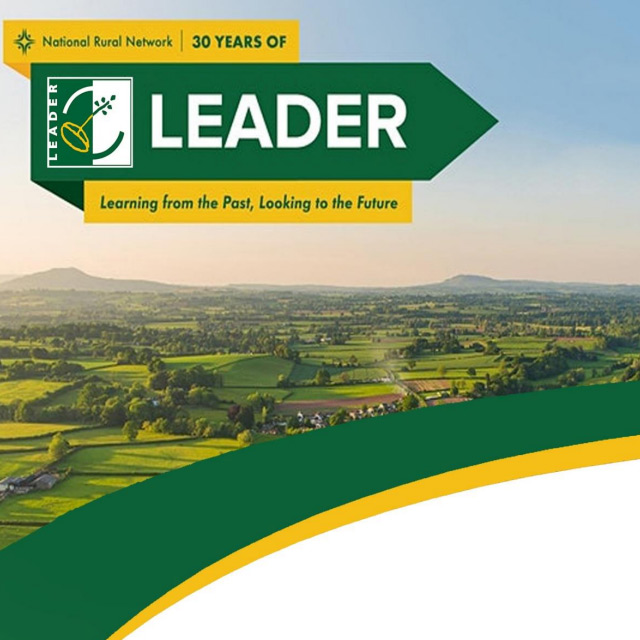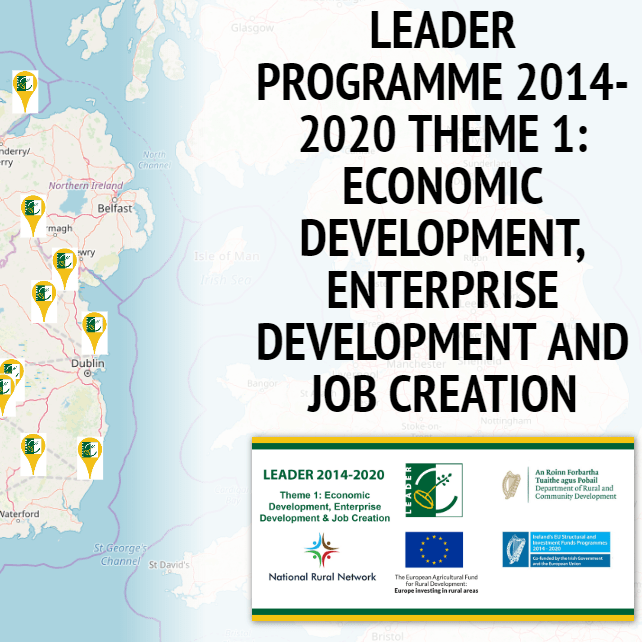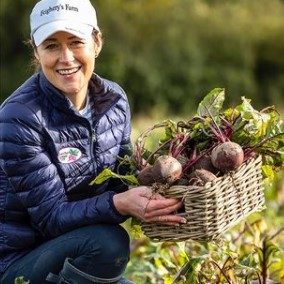LEADER
LEADER supports community-led local development in rural Ireland.
About the LEADER Programme
What is LEADER?

- Economic Development, Enterprise Development
and - Social Inclusion
- Rural Environment.
Since its inception in 1991, LEADER has provided grants to rural Ireland to direct economic and social development through community-led local development. Funded through Ireland’s Rural Development Programme (RDP) 2014-2020, the current LEADER Programme budget provides €250 million in financial grant aid which is 7% of the overall RDP.
For more information on the wider RDP see the Summary of Rural Development Programme Ireland 2014 to 2020 publication.
The LEADER Concept
The LEADER Programme is based on the ‘bottom-up’ approach to rural development. A European Commission report entitled The LEADER Approach – A Basic Guide details the rationale behind the LEADER community-led local development approach.
It states: “The main concept behind the LEADER initiative is that, given the diversity of European rural areas, development strategies are more effective and efficient if decided and implemented at local level by local actors, accompanied by clear and transparent procedures, the support of the relevant public administrations and the necessary technical assistance for the transfer of good practice”
7 Key Principles of LEADER
The LEADER approach to rural development is based on 7 key principles to guide the practice of community-led local development. The principles complement each other and should positively interact for successful LEADER Programme implementation. The 7 principles are deeply connected and work together in tandem as a toolkit to safeguard and build a brighter future for rural communities.
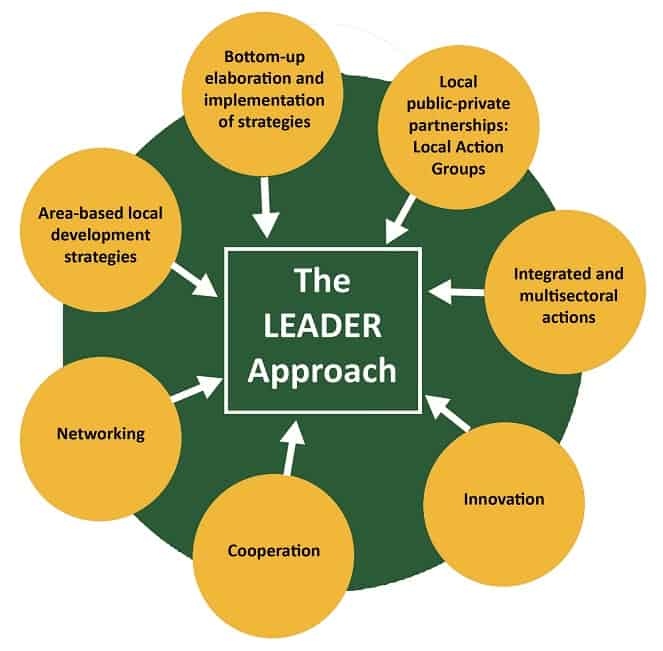
LEADER 2014-2020 Themes and Sub-Themes
The LEADER Programme 2014-2020 includes themes that reflect the overarching needs of rural Ireland. Each theme contains a number of sub-themes. They are considered the key areas in need of the greatest support and with the greatest potential to promote the sustainable development of rural Ireland.
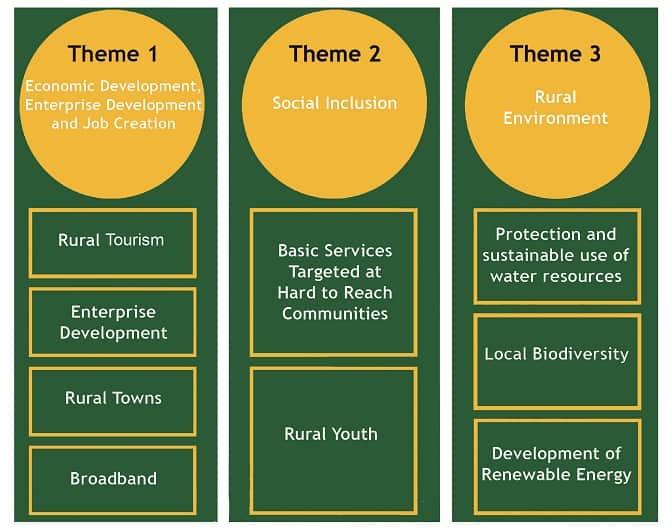
Download the National Rural Network’s leaflet on LEADER Community-Led Local Development for more information.
Local Action Group (LAGs) and Implementing Partners (IPs)
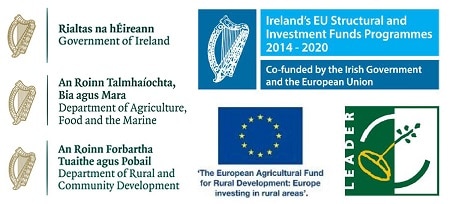
Decisions on LEADER funding are made at a local level by a network of Local Action Group (LAGs). A community-led Local Development Strategy provides the framework within which decisions are made.
- LAGs work within a defined sub-regional geographic catchment area and are made up of both public and private local community members.
Currently 29 LAGs have contracts in place with the Department of Rural and Community Development to deliver the LEADER Programme.- Within LAGs, Implementing Partners are responsible for the day to day management and
co-ordination of the LEADER Programme on the ground. - Implementing Partners provide funding applicants in their catchment area with grant application supports, such as advice, training and mentoring.
For further information on LEADER funding in your local area, including how to apply for grants, you can contact your Local Action Group.
The NRN team at NUI Galway collaborated with David Kelly, Research Technologist at the Whitaker Institute and Moore Institute at NUI Galway to create an informative interactive map of LAGs in Ireland. It details:
- Geographical boundaries of Ireland’s 29 LAGs
- Implementing Partners in each LAG region
- Contact details for each LAG and Implementing Partner, as well as links to websites and social media pages.
The following downloads are also available:
What is LEADER Cooperation?
Cooperation is a feature of a number of Rural Development Programme (RDP) 2014-2020 schemes. The LEADER Cooperation Scheme is designed to encourage rural areas to work together on joint projects with mutual benefits for each participating area. LEADER Cooperation is more than networking. There are many potential benefits, such as:
- Widen local views in order to improve local strategies
- Access information and new ideas
- Learn from other regions or countries
- Stimulate and support innovation
- Acquire skills and means to improve delivery.
Cooperation is a partnership between LAGs but the partnership can also involve non LEADER groups. Cooperation projects between LEADER LAGs and non-LEADER groups may also be eligible where the proposed project is led and coordinated by the LEADER LAG, and the non-LEADER group is implementing a local strategy. Partners must have a direct relevance to the project theme and may have an advisory or a practical role in project management and delivery. It is vital that partners add value to the overall project and its eventual outcomes.
Different types of LEADER cooperation exist:
- Inter-territorial Cooperation takes place between two or more LAGs within a Member State.
- Transnational Cooperation takes place between two or more LAGs from different Member States. For example, cooperation between a LAG from Northern Ireland and Ireland is known as Transnational Cooperation.
Find out more:
- Check out the European Network for Rural Development’s LEADER Cooperation web-based resource.
- Download the toolkit ‘Launching Cooperation North and South’ designed to encourage Transnational Cooperation between Northern Ireland and Ireland.
LEADER Funding: How to Apply
The LEADER Programme provides funding to support community-led rural development. This guide explores how the LEADER funding process works in practice, providing an overview of the main stages and requirements when making an application.
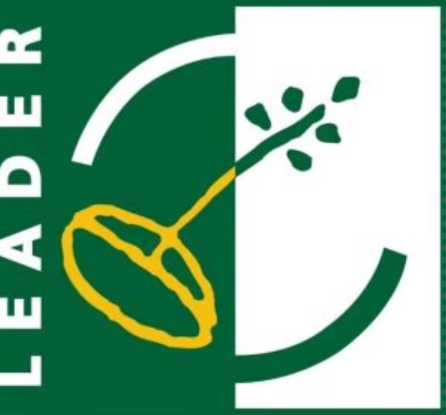
LEADER Dashboard
Irish Local Action Groups and Implementing Partners Database
Latest News
Blog Posts
July 2023 EU CAP Network LEADER E-Newsletter
A new EU CAP Network E-Newsletter dedicated to sharing LEADER experiences and success stories from Local Action Groups (LAGs) across Member States was launched earlier this year. This publication provides a quarterly round-up of the main LEADER-related activities...
‘2014-2022 LEADER Programme in Co. Louth’ Ezine case studies
A fantastic new ezine (electronic magazine) entitled ‘2014-2022 LEADER Programme in Co. Louth’ has recently been published. This features a range of interesting case study examples, which serve to engage and inspire all rural stakeholders. Moreover, the ezine...
The Munster Vales – An Innovative Approach to Rural Economic Development
‘A late summer trip in August 2021 to the Munster Vales was a welcome escape from the suburbs of Dublin after too many months of COVID-19 lockdown. It also gave me an opportunity to see first-hand how the Local Authorities of four adjacent counties have come...
Case Studies
Cavan Communities 4 Climate Action
The need to support training targeted at raising awareness and knowledge of the impacts of climate change on individuals’ daily lives was identified as a priority under the Rural Environment theme of the LEADER Programme in Cavan’s Local Development Strategy 2016....
Restoration of Drumboe Steam Engine and Upgrading Works to Railway Museum
The Donegal Railway Heritage Centre (Donegal RHC), located in Donegal Town, commemorates the operations of the various railways across County Donegal from 1863 - 1959. Housed in one of the few surviving railway stations in the county, it is committed to saving,...
International Appalachian Trail Ulster Ireland LEADER Cooperation Project
The International Appalachian Trail (IAT) Ulster Ireland is a 449-kilometre coast-to-coast cross-border walking trail. Beginning at Slieve League in Co. Donegal, the trail traverses four counties and finishes at the port of Larne in Co. Antrim. Along the route,...
LEADER Resource Centre:
Reports, Videos & Resources
NRN Partners & Funders
Contact Info
Tel: 090 6482744
Email: info@nationalruralnetwork.ie
Address
Unit 2A Moate Business Park,
Clara Rd, Moate,
Co. Westmeath. N37 W9R0




